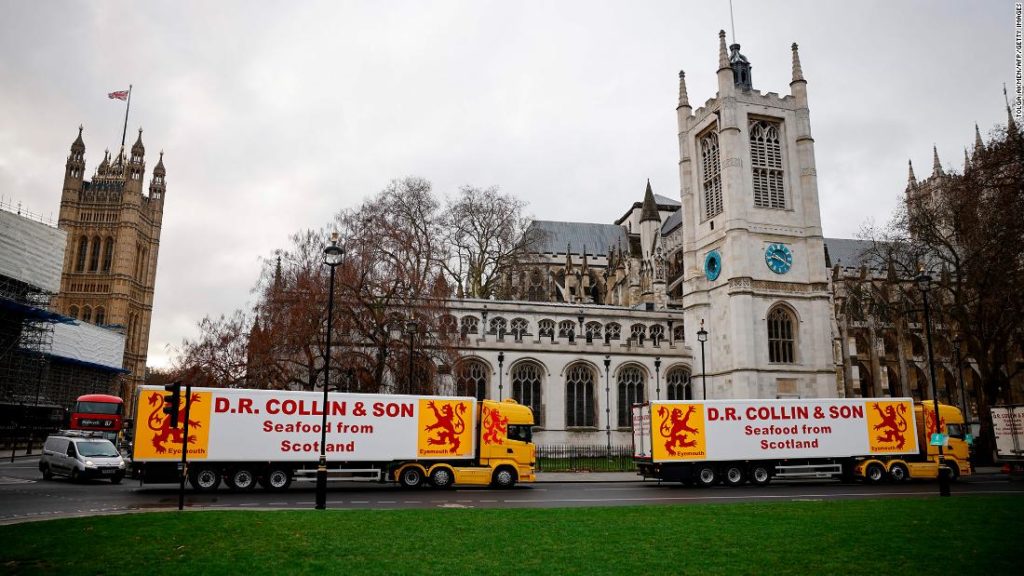Scotland Food and Drink, a trade body, estimates that seafood merchants are losing £1 million ($1.4 million) a day, placing some businesses days away from collapse. Donna Fordyce, the CEO of Seafood Scotland, said that the price of several species of seafood destined for EU markets has fallen by between 40% and 50% because processors are struggling to get products into Europe.
“Losses for the sector are mounting and the situation is urgent,” she said in a statement last week.
One company, which normally ships £1 million ($1.4 million) of seafood to the European Union every week, managed to get just £12,000 ($16,300) of product into the bloc the week before last and has told its 27 suppliers to stop fishing.
“Getting anything out of the UK into the EU is being achieved by luck rather than design,” Fordyce said. “This was inevitable, given such a complicated process was put together at the last minute.”
Following months of fraught negotiations, the United Kingdom and European Union reached a post-Brexit trade agreement on December 24, leaving almost no time for businesses and customs officials to familiarize themselves with new rules that kicked in on January 1.
“What they want us to do now is just impossible to work with live shellfish. Timings, costs involved, paperwork, it’s crazy,” Allan Miller, the owner of Aberdeen-based AM Shellfish, told CNN Business outside Downing Street on Monday.
“If they don’t change [the process] a lot of these companies are going to go out of business,” he said. “A lot of these fishing communities have been fishing for generations. What are they going to do?”
Speaking in Oxford on Monday, Johnson said that UK exporters would be compensated for losses caused by bureaucratic delays. He described current issues as “teething problems” and said the government has set up a £100 million ($136 million) fund to help Britain’s fishing industry take advantage of “great opportunities.”
The prime minister also blamed the closure of restaurants in Europe for a drop in demand for UK fish.
Problems in Scotland
DR Collin & Sons, a seafood business based south of Edinburgh, ordinarily sends one to two trucks a day to France that are each loaded with £150,000 ($204,000) of live lobsters, crabs and langoustines. The company, which employs 200 people, has lost more than 90% of its revenue since January 1, according to head of transport David Rosie.
“We are one of the bigger companies, but it’s certainly not looking good going forward. For the smaller companies, they’ve got weeks, maybe days,” he told CNN Business.
Having furloughed truck drivers and factory workers, the 70-year old firm has been shipping more lobster to Asia by air freight than it’s been selling to neighbors in Europe. “We’re selling more to China and the Far East than to the EU, that’s unheard of in the industry,” he added.
Rosie said the company has been unable to obtain the correct paperwork from Britain’s revenue and customs authority to move its products through France. It has had to return catches to the sea because it can’t get the produce to customers quickly enough.
Some fishermen are making a 72-hour round trip across the North Sea to Denmark to expedite entry into Europe so that their catch will “actually find its way to market while still fresh enough to meet customer demands,” according to the Scottish Fishermen’s Federation.
“Many in our industry now fear for their future,” Elspeth Macdonald, the CEO of the federation, said in a letter to Johnson on Friday. The deal covering fisheries is “desperately poor” and not what the UK government promised the industry, she added.
McMillan threatened to dump rotten shellfish outside UK parliament buildings if he and other Scottish exporters are unable to get their product to market.
— Will Godley and Sarah Dean contributed reporting.
You may also like
-
Afghanistan: Civilian casualties hit record high amid US withdrawal, UN says
-
How Taiwan is trying to defend against a cyber ‘World War III’
-
Pandemic travel news this week: Quarantine escapes and airplane disguises
-
Why would anyone trust Brexit Britain again?
-
Black fungus: A second crisis is killing survivors of India’s worst Covid wave

